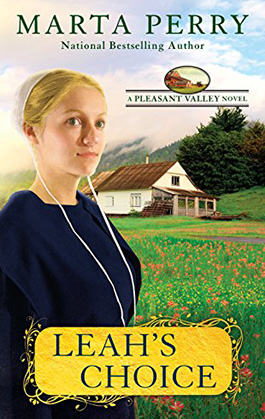Berkley
February 2018
Miniseries: Pleasant Valley, Book One
In the first novel set in the Amish community of Pleasant Valley, a teacher must rely on her faith to guide her heart through challenging times.
All of Pleasant Valley seems to think the newcomer from Lancaster County is the perfect match for schoolteacher Leah Beiler. After all, so few new families come to their secluded Amish community, and even fewer unmarried men. Daniel Glick is a widower with three young children to look after—clearly he's in need of a wife.
But Daniel’s past haunts him at every turn. Though he cannot miss the beauty in Leah’s bright eyes and patient ways, he also sees a reminder of the pain he came so far to escape. Leah, too, has a burden on her heart. Years ago she was engaged to Johnny Kile, and was heartbroken when he decided to leave the Amish community. Since then she has immersed herself in her love of the children she teaches, forgetting any hopes of having her own family.
When Johnny returns, seeking reconciliation, Leah must decide between two pathways, either of which will change her life forever...
Chapter One
Knowing your proper place was a basic tenet of Amish life. Leah Beiler smiled as she watched her class of thirty-five scholars living out that belief. The number was up by three with the addition of the Glick children just today, and they were all in their assigned seats. Thirty-five heads bent over the work she’d set for her first-to-eighth graders, and not a whisper disturbed the stillness of the one-room school.
Despite the quiet, ten years of teaching had given Leah an extra sense where her scholars were concerned. Excitement rippled through the room, even though no head lifted for a furtive look at the battery clock on her desk. The prospect of a picnic lunch to welcome the newcomers had everyone, including, she had to admit, the teacher, excited. It would be a welcome break in the usual routine, with the Christmas program now in the distant past and their end-of-school-year events as yet not begun.
The April weather had cooperated today, bathing Pleasant Valley, Pennsylvania, in sunshine rather than showers. Trough the window she could see the horses and buggies lined up outside that told her the scholars’ mothers had arrived with food for the picnic.
She clapped her hands, amused at the alacrity with which pencils were put down. “It’s time for our picnic lunch now, scholars. We’ll eat first, and then there will be time to play. You may go outside.”
It wasn’t necessary to add that they should go in an orderly manner. Order was another precept of Amish life, engrained since birth. Pencils were in their groove on the desk tops and books were closed before the children stood, murmuring quietly among themselves, and filed toward the door.
Leah followed her scholars between the rows of wood and wrought-iron desks and out the door at the rear of the classroom that led onto a small porch and then to the schoolyard.
The white school building, looking like every other Amish school she’d ever seen, stood in a grove of trees, its narrow dirt lane leading out to the main road, a good half mile away. The Esch farm lay to their east and the Brand farm to the west, so that the schoolhouse seemed to nestle in their protective, encircling arms.
A trestle table had been set up under the oak tree that sheltered the yard. Her volunteer mothers and grandmothers, probably also happy with the break in the routine, had spread it with a bountiful lunch—sandwich fixings of cheese, chicken, cold meat and bread, an array of salads, bowls of fruit and jars of milk and lemonade. Trays of cupcakes and brownies were covered, reminding the children that dessert came last.
Rachel Brand, Leah’s special friend since girlhood, hurried over, apron fluttering, to thrust a well-filled plate in her hands. “Leah, I fixed a plate for you already, ja. If you waited for everyone else to be served, you might miss my macaroni salad.”
“Never,” she said, her pleasure at the day’s treat increased by the presence of the friend who was as dear to her as a sister. “It’s wonderful kind of you, Rachel, but we should be seeing to our guest of honor first.”
Daniel Glick, the newcomer, stood out in the group, the only adult male in a bevy of women and children. If that bothered him, he didn’t show it. He was accepting a heaping plate from her mother, bending over her with courteous attention.
“Your mamm is taking good care of him,” Rachel said. “And if she wasn’t, someone else would jump at the chance, for sure. A widower just come from Lancaster to join our community—you know every woman in Pleasant Valley will be thinking to match him up with a daughter or sister, they will.”
“They’d do better not to matchmake. Daniel Glick looks well able to decide for himself if he needs a wife.”
Daniel’s firm jaw and the determined set to his broad shoulders under the plain work shirt he wore suggested a man who knew what he wanted and wouldn’t be easily deflected from his course. He was probably a good hand at avoiding any unwanted match-making.
Rachel, her blue eyes dancing with mischief as if they were ten again, nudged her. “You’d best tell that to your mamm, then. I expect she’s already inviting him to supper so he can get to know you.”
“Me?” Her voice squeaked a bit, so she was glad that she and Rachel stood a little apart from the others. “Rachel, that’s foolish. Everyone has known for years that I’m a maidal.”
“Years,” Rachel scoffed, her rosy cheeks growing rounder with amusement.
Rachel did still look like the girl she’d once been, her kapp strings flying as they’d chased one another in a game in this same schoolyard. She couldn’t remember a time when Rachel hadn’t been part of her life. They’d shared enough joy and sorrow to bond them forever.
“I know very well how old you are, Leah Beiler,” Rachel continued, “because we were born within a month of each other. And you are only an old maid if you want to be.”
Leah crinkled her nose. “A maidal,” she said firmly. “And I’m a schoolteacher with a love of learning besides, which frightens men off.”
Rachel’s smile slid away suddenly, and her smooth brow furrowed. “Leah, it would break my heart if I thought you meant to stay single all your life because of Johnny.”
The name startled her, and it was all she could do to keep dismay from showing on her face. When Johnny Kile left Pleasant Valley, fence-jumping to the English world like too many young men, he’d left behind his family, including his twin sister, Rachel, who’d loved him dearly.
And he’d left Leah, the girl he’d said he’d loved. The girl he’d planned to marry that November, once the harvest season was over.
Many of those young men who left came back, penitent and ready to rejoin the community, after a brief time in the English world. But not Johnny.
She had to speak, or Rachel would think this more serious than it was. Close as they were, she didn’t want Rachel to know how Johnny’s loss had grieved her. It would only hurt her, to no good end.
“No, of course that’s not why. Johnny and I were no more than boy-and-girl sweethearts, you know that.”
Rachel’s hand closed over hers in a brief, warm grip. “You loved him. That’s what I know.”
“It was a long time ago,” she said firmly, shutting away bittersweet memories. “What has brought on thoughts of him today?”
Rachel had not mentioned Johnny’s name since the day she’d run to the Beiler house, tears streaming down her cheeks, to tell Leah that he had gone. It had shamed his family, as well as grieved them, that he’d left in that way, with no word for his betrothed and only a short note for them.
“No reason,” Rachel said, but her gaze drifted away from Leah’s.
She set down the filled plate on the nearest table so she could grasp her friend’s wrist. “Rachel, tell me the truth.” It was the warning tone she used with her scholars when they attempted to evade a question.
Rachel shook her head, dashing away a sudden tear. “My birthday is next week. Johnny’s birthday, too, of course. It reminds me.”
“And it hurts,” she said softly. She knew about that pain.
“I’m being foolish.” Rachel sniffed. “Here come your mamm and Daniel Glick to talk to you. I’d best see if any of those platters need filling.” She scurried off, giving no chance for Leah to say a word of comfort, even if she could think of one.
For a moment the scene—the mothers serving food, chattering among themselves, the children eating quickly so they could scatter to swings, seesaw, and ballfield—seemed to shimmer before her eyes. She was a girl again, hearing her sweetheart say he loved her.
She took a breath, clenching her hands against the dark-green apron that covered her dress. She wasn’t that girl in love any longer. She was a grown woman, a teacher, and she had to act like one.
And here came her mother, towing the newcomer along with her. “Leah, here is the father of your new scholars. Daniel Glick, this is my daughter Leah.”
He was taller than many Amish men, that was her first thought. She had to tilt her head to look up at him. Piercing blue eyes met hers, their straight brows giving him a bit of a sober look. His beard was the same chestnut brown shade as his hair, and his mouth above the beard firm.
“Wie bist du heit. It’s nice to meet you.”
“Teacher Leah.” He nodded in greeting, fingering the brim of his straw hat. “It’s kind of you to take on three new scholars with the school year so near over.”
She grasped a firm rein on her scattered thoughts. “I’m happy to have them. I look forward to getting to know Matthew and Elizabeth and Jonah.”
“They are glad to be back in class again after the move.” He glanced toward the table where the children sat eating, his face serious. “I would like to talk with you about their schooling. Perhaps when they finish today?”
The prompt request took her by surprise a bit. Still, since the Glick family had just moved here, their situation was different from that of her other scholars, most of whom she’d known since birth, seeing them at work frolics and worship services, watching them grow.
Daniel, being a widower, had to be both mother and father to his children, so she was glad to see that he was interested in his young ones’ education.
“Ser gut,” she said. “I’ll see you at three, then.”
He gave a short nod to her, another to her mamm, and walked off toward the table where the children were having their lunch.
She watched him go, wondering a little. Still, there’d be plenty of time later to think about what changes the addition of the Glick family might make to her familiar classroom.
She turned to her mother, and her heart clenched with a familiar worry. “Mamm, why don’t you let the others take care of the cleaning up and go along home after you eat? You look a little tired.”
Her mother always insisted that she was well now, completely recovered from the cancer surgery that had worried them all so much a year ago, but even so, anything out of the ordinary seemed to exhaust her, though she hated to admit it.
“I’m not tired,” her mother said predictably. “Well, what do you think of Daniel Glick? A strong-looking man, wouldn’t you say? And the three children so bright and happy. They’re a fine addition to our community. Aren’t they?”
Her heart sank at the indication that her mother was, as Rachel had said, embarking on matchmaking. It was hardly surprising, since Mamm had tried her best to pair her eldest daughter up with every eligible man in their central Pennsylvania Amish community.
She had even suggested a visit to distant relatives back in Lancaster County a time or two, in hopes of finding a husband for her stubborn child.
It had taken all Leah’s determination to hold out against her mother’s loving wishes for her. Mamm thought Leah should forget her disappointment in Johnny and love again. But Mamm didn’t know the whole story.
“They seem very nice,” she said. Daniel Glick was an unknown quantity. All she could say now was that he appeared interested in his children’s education. As for the children--
She had to banish a frown before Mamm saw it. Happy and healthy, Mamm had said. Certainly the children looked sturdy enough, but she was not so sure about the happy part, at least as far as the older two went. Both Matthew and Elizabeth had seemed withdrawn, resisting her efforts to get to know them this morning.
They might just be struggling to get comfortable in a new place. So why did she have this niggling little feeling that something was wrong?
Jacob Esch, the eighth-grader she’d appointed to watch the clock, began to ring the bell that signaled it was time for play. She’d found that without a reminder, some of the scholars would skimp on their eating to be first on the swings.
Children ran toward the swings and seesaw, the little girls with their braids and bonnet strings flying in the wind, the boys racing one another as they always did. Some of the older ones grabbed bats and balls.
The Glick children seemed to hesitate. Then Matthew walked toward the ball field, while Elizabeth took her little brother’s hand and led him to the swings.
Leah glanced toward Daniel Glick. He stood near the picnic table, arms crossed over his chest in a way that seemed to close him off from the rest of them. And the steady gaze he directed toward his children was so intent it startled her.

















